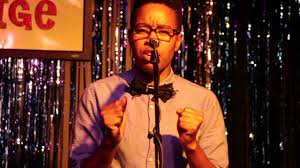J Mase’s III’s “Josephine” and Clarence Jordan’s “Cotton Patch Gospels” by Amanda Staab

Trans poet J Mase III’s slam poem “Josephine” is a refreshing look at the Bible story of Joseph and his all-too-familiar coat of many colors. He essentially relabels Joseph, Josephine, Jo of Genesis, as a queer character, an idea that surely gave everyone in the audience something to think about as they walked out of the venue that night.
His message reminded me of something I learned about in a Christian religion class I took last year at Olaf. Doesn’t sound like it belongs in an entry about trans people? Hear me out. We read about and studied a white Christian man named Clarence Jordan who fought for shared community living between white and black people. He rewrote Bible stories of Jesus and letters of the New Testament as if they took place in the 20th century American South. Jordan dubbed these stories “The Cotton Patch Gospels.” In this collection, Jesus was a black man. His crucifixion was rewritten as a lynching scene. Jews and Gentiles become “white men and Negros.” And so forth. Some pretty heavy stuff.
These stories were reworked in this way to give conservative whites a means to relate the struggle of black people through their own belief system: the Christian tradition. Jordan sought to translate ideas in a way the community would understand. If they wouldn’t listen to the words of those they refuse to accept, make them listen to their own words. It’ll disgust and confuse them at first, perhaps, but they won’t be able to shake it. That was the logic behind this project.
It is regrettably difficult for people to understand or accept something that is new and foreign to them. We see this time and time and again. This class especially highlights these inequalities. We see it in the rights of women, people of color, different classes, different sexualities, and so forth. It’s unfortunate that outdated tradition can triumph over new ideas without hesitation. It takes so much longer than it should for marginalized people to gain rights. Therefore in 1960s Georgia, the concept of black and white people possessing the same rights seemed, to many, unheard of. Jordan’s idea to put this issue in a format that white Christians could relate to was genius. It’s like they were able to hear his message – and the message of all those fighting for civil rights – in their own language. The language of the Bible.
J Mase III does something very similar in his poem. Clarence Jordan’s gospels do not relate to trans issues, this I know, but the techniques these two use to get their messages across are similar. For those who do not understand or support the rights and trials of transgender people, J Mase III puts his message into a “different language,” just like Jordan does. Bible stories are something that many people in America have grown up with. They are digestible, they are familiar.
This prevalence of religion in society becomes clear when J Mase III begins his poem by speaking about a woman who “asks if she can talk to [him] about Jesus at 3 am on the C-train because something about [his] queer face means clearly [he is] on a path straight to hell.” This was evidently a formative experience, or rather an example of many similar experiences he was forced to endure as a young queer person. He goes on to interrupt this woman’s ramblings before she can tell him all the things he is doing wrong. But instead of rejecting her choice to speak about religion, he uses it as a tool. He says, “It is my turn to proselytize.” J Mase III tells the nameless woman about the bible character Joseph the way that he sees him. He asserts that Joseph’s coat is, in fact, a princess dress. When sold into slavery by his jealous brothers and assumed dead, J Mase bellows to Jo, “The very ground you walked on mourned the loss of its genderqueer child.” But in Egypt, Joseph was not seen as a slave or a “fag or tranny.” He was seen as a person, as someone worthy enough even to be a leader. And only then does his family see him the way he deserves to be seen, as someone magnificent and deserving.
The young poet uses Joseph, Josephine, Jo, to reclaim the place of his people in the Bible and in religion. This story of a queer person as the hero is one so scarcely portrayed, one too often covered up. J Mase III cries out, “You’ve been lying about my people for too long.”
By giving his audience an alternative look at this familiar story, J Mase III transfers his message to a platform that more may understand. I, for one, had never thought of Joseph as queer. The coat was always just a coat to me. But I truly wish I heard this story growing up. Just like I wish I heard Clarence Jordan’s. And I hope desperately that the people who need to hear these stories in “their language” will. Like the lady on J Mase’s 3 am train. And the pastor who asserts to J Mase that his “word is from God.” Because J Mase deserves a world that he is welcome in. And so do the queer kids that he fights for.
J Mase III. “Josephine (The Bible on Trans* People).” Youtube, 13 Sept 2013, https://youtu.be/1QgLjR7UTVE.